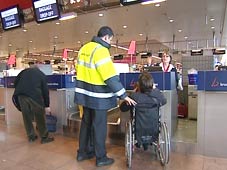EU Ensures Access to Air Transport for Persons with Reduced Mobility
Share on social media
On 26 July, new rules came into force to offer persons with disabilities and those with mobility impairments access to air transport, comparable to that of any other passengers flying from airports in the European Union.
 On 26 July, new rules came into force to offer persons with disabilities and those with mobility impairments access to air transport, comparable to that of any other passengers flying from airports in the European Union.
On 26 July, new rules came into force to offer persons with disabilities and those with mobility impairments access to air transport, comparable to that of any other passengers flying from airports in the European Union.
The Commission believes that these measures will provide an effective response to the needs of a large and – with Europe’s demographic ageing – growing section of the population.
“The phasing-in of these rules will put an end to discrimination and give disabled and elderly passengers the help they need”, said Jacques Barrot, Vice President of the European Commission in charge of transport.
Around 10% of the EU population is affected by reduced mobility – these are mainly disabled and elderly people, while others are unable to walk long distances as often required in modern airports. Most airlines and airports make genuine efforts to offer the necessary assistance. However, not all of them provide comprehensive assistance, free of charge.
These problems are addressed by Regulation (EC) No 1107/2006, adopted by the Parliament and the Council on 5 July 2006, which provides for persons with reduced mobility to travel by plane without difficulty. The Regulation’s provisions cover three areas; those covering the first area, in three parts, entered into force on 26 July.
Equal treatment of persons affected by reduced mobility
For flights from airports in the EU, the Regulation prohibits the refusal by airlines and tour operators to carry passengers, or to take bookings, on the basis of reduced mobility. Exceptions can be made only for duly justified safety reasons. This should put an end to (generally unintended) instances of discrimination.
Free assistance in all EU airports
As from 26 July 2008, airports have to provide a specific set of services for persons with reduced mobility.
Assistance on board
On flights from EU airports, airlines will be obliged to provide certain services, such as the carrying of wheelchairs or guide dogs, free of charge. These rules also entered into force on 26 July 2008.
The EU’s Member States, for their part, have to set up enforcement bodies responsible for ensuring that the Regulation is applied on their territory. Some Member States have already given the Commission the details of the body responsible, while others – Latvia, Lithuania, Malta, Poland and Romania – have indicated that they intend to designate their enforcement bodies shortly.
Any person affected by a disability or by reduced mobility who considers that these rights have not been respected can bring the matter to the attention of the management of the airport or the airline in question. In case of an unsatisfactory response, a complaint can be made to the national enforcement body designated by the Member State.
For further information, visit:
Air Transport Portal of the European Commission
Additional resources on this subject may be found on the ENAT Theme page:
Airports, Airlines and Air Travel
